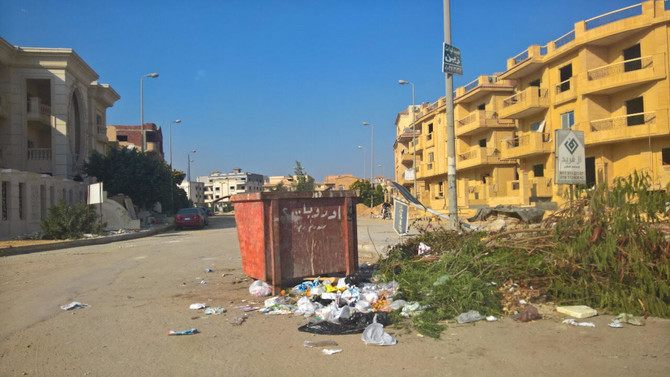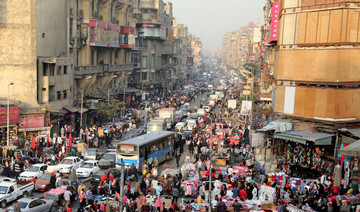NEW CAIRO: It was supposed to offer a more desirable way of life away from the Egyptian capital’s crowds, traffic and pollution.
Affluent Egyptians could pay some of the county’s most expensive property prices to live in the “city of the rich,” as it became known.
But for those who did follow the dream to New Cairo, the reality has turned out to be something far from what was promised when it was built 20 years ago.
Water shortages, internet outages, poor hospital facilities and crumbling infrastructure are among the list of problems faced by long-suffering residents. The problems have built up over years, each one uncovering the corrupt deals that put the city together.
In the last few months, residents have reached boiling point.
“Water is continuously cut out from our area,” Sahar Abo Hagras, a New Cairo resident, told Arab News.
She said no officials ever come out to the city to explain the problems or when the water will return. “Should this be a way to live?”
The water shortages have been a major issue in the city in the last six years. The existing water pipes are below the required standards and keep exploding. Outages of at least two to three times a month or in some cases, up to three days.
Videos showing rivers of water filling the streets of New Cairo after the pipes burst are shared regularly. On a social media group for the city’s residents, which has more than 70,000 followers, there are floods of posts complaining about water problems, illegal use of the apartment buildings and shops, and nostalgic laments to how the city began.
“Frustration among the community has been noticeable due to the expanding problems in the city,” Noha Ezz, the administrator of the most popular New Cairo Facebook group, told Arab News. “People are complaining about many issues and their requests are mainly basic human needs like water and law enforcement.”
Tamer Atef, one of the leaders of Narges Voluntary group, said the residents had taken matters into their own hands to try and improve things.
“We bridge the gap between the administrative entities and the residents,” he told Arab News. “In the past three years we solved major problems - from sewage systems, road completion and redesign and many others.
“Residents are angry and can’t communicate with the government entities. We step in and push the problems towards development.”
Roads in the city also suffer from neglect and a lack of law enforcement. Many are flooded with sewage, and covered with building waste.
The buildings themselves have become completely misused. Thousands of units meant for housing have been turned into commercial premises.
A wave of street sellers have taken over the once orderly development to turn it into the urban chaos found in traditional Egyptian cities.
“This is my source of income and how I feed my kids,” one of the vendors selling hot meals on the street told Arab News. “I don’t break the law. The employees of the city’s administration collect moneys from us on a regular basis and we are offering a good service for the poor workers here in the city.”
But residents said they paid millions of Egyptian pounds to escape the chaos, and many blame corruption in New Cairo for dragging the city down.
In the last two years the administrative head of the city has changed twice. The first, Alaa Abdel Aziz was moved to a different role three months after residents protested outside his office to demand his departure.
Later came Mostafa Fahmy, a former army officer, who was also sacked after a major rupture of the city’s sewage system destroyed homes and shopping malls in heavy rain last winter.
Sources close to Fahmy said he was warned about the poor state of the sewage systems on several occasions and had to pay the price for the mistakes of his predecessors.
Manar Marawan, who joined the board of the New Cairo council two months ago, told Arab News, that there are many issues that will take a “very long to solve.”
“We have a roadmap and a development plan to implement to enhance this picture however the development of the administrative mindsets will be our main obstacle,” he said.
Dr. Mohamed Abdalbalaki, a professor of urban planning at Cairo University and head of the Center for Architectural Studies and Planning, said a main problem was overpopulation of the new cities.
“Most of the new cities have been planned for more than 20 years and are suffering from the depletion of their infrastructure, because they are not planned to accommodate the size of the population that they have now,” he said.
The country now has more experience in how to build new cities, he said, including the new multi-billion dollar administrative capital 40 kilometers from Cairo.
The capital will span 700 square kilometers, making it almost as large as Singapore, and is intended to house 5 million people.
But for those who invested in, and moved their lives too, New Cairo, the struggle continues.



























